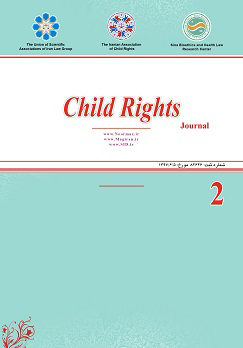Minimum Intervention Model in Response to Children Unlawful Behaviors in court Complex of Shahid Fahmideh, Tehran, Iran (2016-2017)
Subject Areas : child rightsHossein Gholami 1 , Hassan Ali Moazenzadegan 2 , Nafiseh Zaeri 3
1 - Associate Professor, Allameh Tabatabai University, Tehran, Iran
2 - Associate Professor, Allameh Tabatabai University, Tehran, Iran
3 - M.A, Allameh Tabatabai University, Tehran, Iran
Keywords: Response, Children, Shahid Fahmidah Judiciary Complex, Minimum Intervention Model,
Abstract :
Models of response to children unlawful behaviors are grouped into five categories, penal justice, welfare, restorative, minimum intervention, and risk management. Each of these models attempts to correct delinquent children in a different way and with varying degrees of impact, and non-punishment or mild punishment may lead to further correction of delinquent children in certain offenses. This study aimed to compare the extent and manner of application of the Minimum Intervention Model with other models in Shahid Fahmideh Judicial Complex of Tehran. It was performed through the explanatory content analysis method and the statistical population consisted of 100 cases selected from two branches of this complex using the purposive non-probability sampling method. After the data were collected, they were analyzed in SPSS, and the percentages of frequency were as follows: 20% of the cases were not responded due to order for suspension of prosecution and 76% of the cases had at least one of the intervention indicators in addition to other response models. Findings indicated that the judges of this complex used the Minimum Intervention Model more than other models. Although the use of this model in the area of criminal justice for children and adolescents is a positive action, it must be adjusted in some offenses.
1. Mohajerani A. Age Structure and Issue of Iran's Young Population. Iranian Journal of Applied Sociology 1989; 2: 35-48.
2. Riff D. Analyzing Media Messages. Translated by Boroujerdi Alavi M. Tehran: Soroush and IRIB Research Center; 2002.
3. Jarborg N. Criminalization last resort. Ohio State Journal of Criminal Laws Last Resort, Oxford Journal of Legal; 24: 24.
4. Gholami H. Principle of Minimum Criminal Law. Journal of Criminal Law Research 2012; 1(2): 41-66.
5. Nobahar R. Principle of Minimum Application of Criminal Law. Journal of Criminal Law Teaching 2011, new(1): 91-114.
6. Amir Arjomand A. A Compilation of International Human Rights Instruments. Tehran: Shahid Beheshti University; 2002. Vol.1.
7. Fatic A. Punishment and restorative crime handling. Sydney: Averburg Pub; 1995.
8. Arblaster A. The Rise and fall of Western Liberalism. Translated by Abas Mokhber A. Tehran: Center; 1998.
9. Nourani N, Hamidiyeh B. Recognition of Liberalism. Journal of Development Strategies 2005; 1(4): 103-128.
10. Bordeaux G. Liberalism. Translated by Ahmadi A. Tehran: Ney Publication; 2004.
11. Kelly J. A Short History of Western Legal Theory. Translated by Rasekh M. Tehran: Tarh-e No Publication; 2009.
12. Mireille D. Les grands systems de politique criminelle. Translated by Najefi Abrandabadi AH. Tehran: Mizan Publication; 2009.
13. Braithwaite J, Pettit PH. Not just deserts, a Republican Theory of criminal Justice. Oxford: Clarendon Press; 1990.
14. White R, Haines F. Crime and Criminology. Translated by Salimi A, Karkhaneh M, Mokhatab Qomi F. 7th ed. Qom: Howzeh and University Research Center; 2004.
15. Masjed Saraei H, Nabi Nia KH, Bagheri A, Sadri M. Principle of Criminal Saving as the Basis for Interpretation of Islamic Criminal Laws and Rules. Jurisprudence and Islamic Law Research 2018; 14(51): 169-190.
16. Mohaghegh Damad M. Rules of Jurisprudence (Criminal Part). Tehran: Islamic Science Publishing Center; 2000.
17. Khoei A. Principles of Takmelat Almenhaj. Najaf Ashraf: Al-Adab Publication; No Date.
18. Frase R. Punishment puposes. Stanford Law Review 2005; 58(1): 67-83.
19. Makki Ameli (First Martyr) M. Al-Qavaed va al-Favaed (Rules and Benefits). Qom: Maktaba al-Mufid; No Date.
20. Gholami H. Patterns or Types of Child Criminal Justice. Iranian Journal of Criminal Law Doctrines 2013; 6: 89-106.
21. Rafi Pour F. Kandokavha va Pendashteha (Investigations and Assumptions). Tehran: Enteshar Stock Company Publication; 1993. [Persan]


